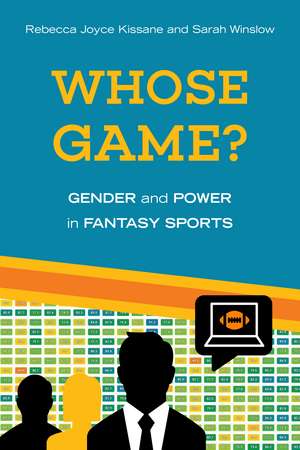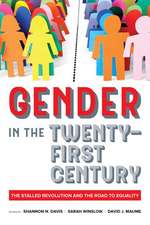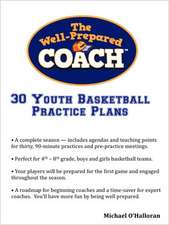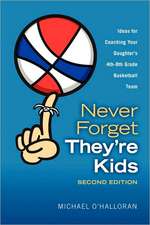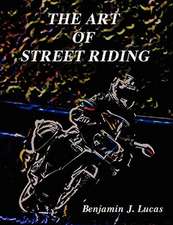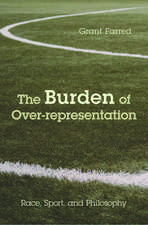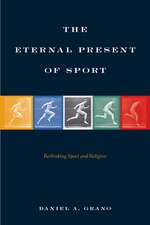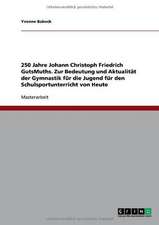Whose Game?: Gender and Power in Fantasy Sports: Sporting
Autor Rebecca Joyce Kissane, Sarah Winslowen Limba Engleză Hardback – apr 2020
This pioneering book examines gendered structures and processes, such as jock statsculinity—a nerdish form of masculine one-upmanship—and how women are often rendered as outsiders. Ultimately, Whose Game? demonstrates that fantasy sports are more than just an inconsequential leisure activity. This online world bleeds into participants’ social lives in gendered ways—forging and strengthening relationships but also taking participants’ time and attention to generate negative emotions, stress, discord, and unproductivity.
Din seria Sporting
-
 Preț: 174.33 lei
Preț: 174.33 lei -
 Preț: 122.31 lei
Preț: 122.31 lei -
 Preț: 137.16 lei
Preț: 137.16 lei -
 Preț: 131.26 lei
Preț: 131.26 lei -
 Preț: 220.74 lei
Preț: 220.74 lei -
 Preț: 193.68 lei
Preț: 193.68 lei -
 Preț: 346.00 lei
Preț: 346.00 lei - 23%
 Preț: 502.31 lei
Preț: 502.31 lei -
 Preț: 256.58 lei
Preț: 256.58 lei -
 Preț: 213.65 lei
Preț: 213.65 lei -
 Preț: 167.58 lei
Preț: 167.58 lei
Preț: 536.74 lei
Preț vechi: 697.06 lei
-23% Nou
Puncte Express: 805
Preț estimativ în valută:
102.70€ • 107.24$ • 84.81£
102.70€ • 107.24$ • 84.81£
Carte disponibilă
Livrare economică 25 martie-08 aprilie
Livrare express 08-14 martie pentru 29.38 lei
Preluare comenzi: 021 569.72.76
Specificații
ISBN-13: 9781439918869
ISBN-10: 1439918864
Pagini: 257
Ilustrații: 3 tables
Dimensiuni: 152 x 229 x 25 mm
Greutate: 0.45 kg
Ediția:1
Editura: Temple University Press
Colecția Temple University Press
Seria Sporting
ISBN-10: 1439918864
Pagini: 257
Ilustrații: 3 tables
Dimensiuni: 152 x 229 x 25 mm
Greutate: 0.45 kg
Ediția:1
Editura: Temple University Press
Colecția Temple University Press
Seria Sporting
Recenzii
“Whose Game? is well written and compelling, and the research important and timely. The authors’ sociological examinations of fantasy sports make a convincing argument that this is a unique realm of fandom. In its gender analysis, Whose Game? is a strong, valuable contribution to the literature. The breadth and depth of the data make for a rich analysis that allows us to examine and understand patterns of meaning and experience. This book will have significant appeal to those in the fantasy sport world, including participants and organizers, as well as general sports fans.”—Rachel Allison, Assistant Professor of Sociology at Mississippi State University and author of Kicking Center: Gender and the Selling of Women’s Professional Soccer
“In this fascinating new study, Kissane and Winslow show us how often aging, non-athletic men can engage in fantasy sports leagues as to both secure a claim on legitimate masculinity and, importantly, to forge much needed emotional bonds with other men. Through careful research, Whose Game? documents the possibilities and perils involved in playing fantasy sports and issues an important call for thinking seriously about the way leisure and fun can reinforce existing gendered, raced, and classed inequalities.”—C.J. Pascoe, Associate Professor in the Department of Sociology at the University of Oregon, and author of Dude, You’re a Fag: Masculinity and Sexuality in High School
“In this fascinating new study, Kissane and Winslow show us how often aging, non-athletic men can engage in fantasy sports leagues as to both secure a claim on legitimate masculinity and, importantly, to forge much needed emotional bonds with other men. Through careful research, Whose Game? documents the possibilities and perils involved in playing fantasy sports and issues an important call for thinking seriously about the way leisure and fun can reinforce existing gendered, raced, and classed inequalities.”—C.J. Pascoe, Associate Professor in the Department of Sociology at the University of Oregon, and author of Dude, You’re a Fag: Masculinity and Sexuality in High School
Notă biografică
Rebecca Joyce Kissane is an Associate Professor of Sociology at Lafayette College. Sarah Winslow is Senior Associate Director of the Honors College, Director of the National Scholars Program, and Associate Professor of Sociology at Clemson University, and co-editor of Gender in the 21st Century: The Stalled Revolution and the Road to Equality.
Descriere
Demonstrates how fantasy sport offers a space in which its participants experience gendered power while they engage in an active, competitive fandom
